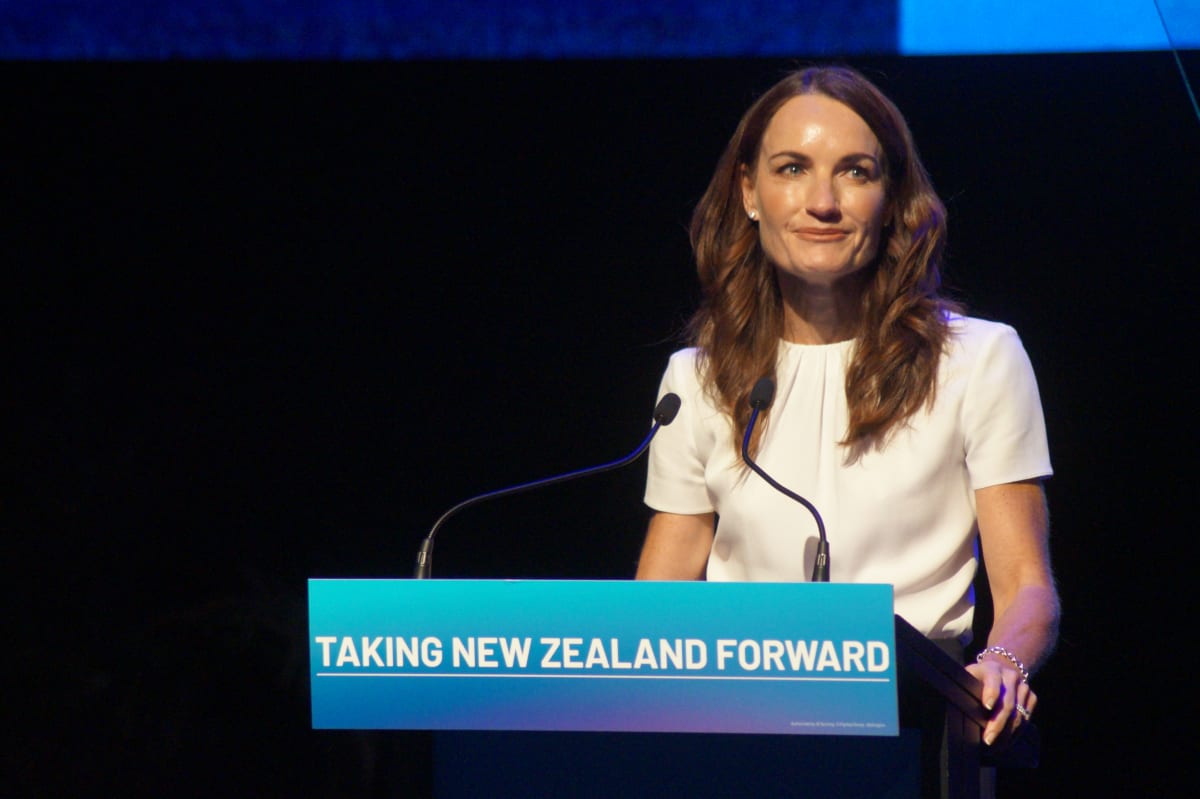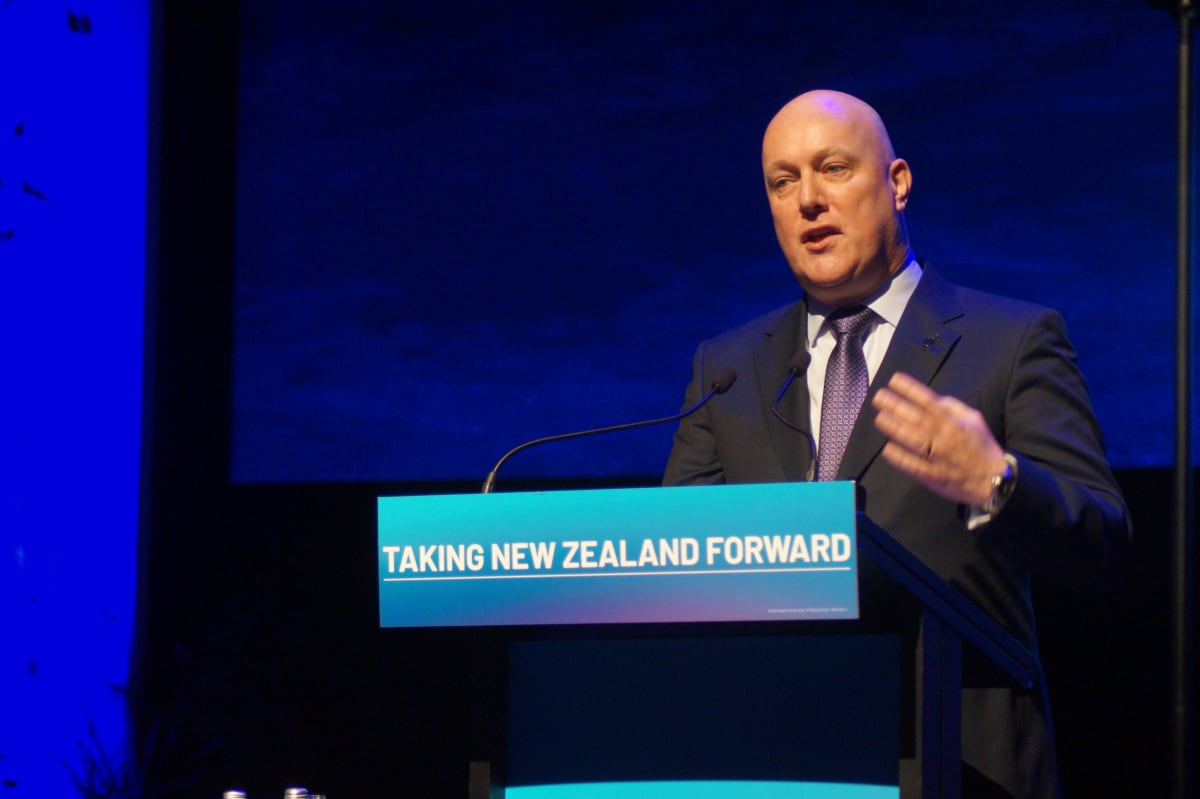
The first day of National's annual conference was as much about shaking off remnants of the party's unpleasant past as its new leader outlining the path ahead, Sam Sachdeva writes
Little expense seems to have been spared as Christopher Luxon seeks to make a good impression at his first conference as National Party leader.
Christchurch's Te Pae conference centre has served as an impressive venue for proceedings, while the party has a new website (complete with splashes of purple) and a swathe of sharply edited videos which were played to delegates in between set pieces.
The conference opening was more about meeting the man than his grand vision for Aotearoa, Amanda Luxon introducing her husband as a dedicated family man who had balanced a high-flying business career with his children.
“Living in Chicago, he would put them to bed at night, take a late flight to Argentina, work all day, and take an overnight flight back in time to wake the children to go to school the next morning.
“Whatever happened in his day, when he walked through that door, the children got his undivided attention.”
In his own speech, Luxon leaned on his Christchurch roots, mentioning his grandfather’s role as a groundsman at Hagley Park.
“Growing up, dad and his brothers helped in that role, and I think it's fair for me to therefore claim that I have Canterbury soil in my blood.”
A hint as to the origin of his entrepreneurial inclinations came from a description of his father, who made his way from sales representative to manager with the help of some motivational books.
Luxon himself took inspiration from the works of Christian businessman Charlie ‘Tremendous’ Jones, as he tried to set up a source of childhood income as a 13-year-old.
“I decided that window washing was going to be a possibility: I started door knocking the shops, I tried 20 times the first day and I got 20 straight nos, but like Charlie ‘Tremendous’ Jones said, you just have to keep going.
“And so maybe I changed my pitch, but by the end of the next day, I had half a dozen shops signed up to weekly window cleans.”

The anecdote certainly fit the image of a relentlessly driven individual, as did the moment on a central Christchurch walkabout when he asked a 13-year-old to share his 10-year plan.
Luxon’s speech, and many others, were heavily laden with the sort of red-meat remarks which help gee up a party’s base.
Deputy leader and finance spokeswoman Nicola Willis promised tax cuts and criticised the Government’s overly aggressive borrowing and spending during the Covid-19 response.
“While all countries put their foot on the accelerator to some extent, our government put its pedal to the metal…
“No car can drive that fast without a moment of reckoning, and no economy can either.”
The cost of living payment was labelled KiwiSpray - a moniker unlikely to catch on - while there was a scathing reference to David Parker’s “idol, the socialist economist and wealth-tax advocate Thomas Piketty” as Willis suggested Labour’s denials about introducing such a tax could not be trusted.
There will be more right-wing dogma on Sunday when Luxon delivers his main conference speech and unveils a new party policy, understood to be an effort to reduce the number of young Kiwis on the Jobseeker benefit for extended periods of time.
The policy fits with the desire to back Kiwi businesses looking for workers, but may well be criticised by Labour and others as unfair beneficiary bashing, given a reasonable proportion of long-term Jobseeker recipients have health issues affecting their ability to work.
The legacy of Collins’ one full year as leader is hardly a positive one: in the board’s annual report, party secretary William Durning described “considerable challenges with fundraising following on from the 2020 election result”, while membership had also dropped back from 2020 levels and was well under a target for 2021.
If the first day's proceedings felt a little generic at times, that was probably not the worst thing for the party, with reports published as part of conference proceedings offering a reminder of the trauma that was National’s 2021.
In his president’s report, Peter Goodfellow wrote of Luxon’s election last November after Judith Collins “stepped down” as leader - a charitable description of the way she was forced out by National’s caucus after a failed attempt to torpedo rival Simon Bridges.
The legacy of Collins’ one full year as leader is hardly a positive one: in the board’s annual report, party secretary William Durning described “considerable challenges with fundraising following on from the 2020 election result”, while membership had also dropped back from 2020 levels and was well under a target for 2021.
In fairness, the Papakura MP can hardly take all the blame given the dire circumstances under which she inherited the leadership, as well as the broader structural problems outlined in the post-campaign review.
But the dwindling money and membership shows exactly how corrosive a bad election result can be to a party’s morale - and the importance of the new leadership turning those trends around.
There are some positive signs on that front, with more than $2 million of large donations flowing in this year and roughly 650 delegates - an apparent record - flooding into Christchurch’s Te Pae convention centre.
Whether by design or coincidence, Luxon also has a chance to stamp his mark on the party’s wider organisational structure following the departure of long-tenured individuals.

The resignation in May of party secretary and general manager Greg Hamilton flew under the radar, despite a 12-year stint in the job including a few unpleasant moments in the spotlight.
Goodfellow’s step away from the presidency was altogether more conspicuous, given the sharply polarised views of him both within and outside National.
Goodfellow has been drawn into controversies surrounding Todd Barclay, Jian Yang, Jami-Lee Ross, and more recent botched candidate selections, yet he seemed immovable.
Even now, he is departing with the certainty of a further term on the board, suggesting his influence, while diminished, is far from defeated.
The standing ovations both before and after his farewell speech were decidedly patchy, and Goodfellow nodded at the frustration felt towards him.
“We haven't always got it right or achieved the results that we wanted, but I'll never live with the regret of not trying new things, embracing new technology, or trying to help our party move into the 21st century.”
The speech was notably devoid of snide remarks in previous conference efforts - such as the 2018 declaration National had "dodged a whisky-swilling, cigarette-smoking, double-breasted and irrational bullet” and 2020’s disparagement of “infectious clickbait journalism and heavily partisan powers of government being used against us” - which seemed to cut against the wider party’s messaging.
Indeed, the most controversial moment came when Goodfellow placed a vase gifted to him by National’s Chinese wing disconcertingly close to the edge of a table, oblivious to the groans of hundreds in the room.
Luxon's leadership is not quite as precariously positioned, but the reaction to his Sunday speech and policy unveiling could be telling after weeks of negative headlines and flubs have put him on the back foot.







